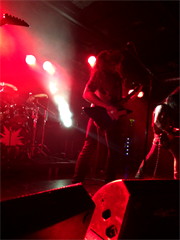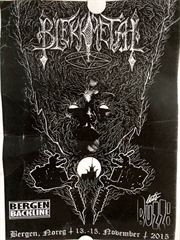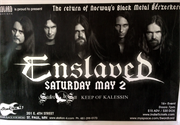
Deathcult live at Inferno Festival, April 2015. Photo: Chris Thompson.

Blekk Metal poster. Photo: Chris Thompson.

Enslaved on tour in the US. Photo: Chris Thompson.
It is a rare thing to be able to work and make a living with one of your passions and it is even rarer when you can work with two of your passions in the same project. This is precisely why I feel extraordinarily fortunate to do my research. As I mentioned in yesterday’s blog entry, history has been a life-long interest of mine. However, it has not been my only long-standing interest. Music, particularly rock and metal, has been integral in the development of the person I am today. As with my interest in history, my gravitation toward rock and metal began at an early age. I vividly remember riding in the car with my father listening to and enjoying the likes of Jimi Hendrix, Cream, Pink Floyd, and Black Sabbath when I was around six and seven years old. MTV was also omnipresent while I was growing up. Unlike today, the programing of MTV in the late 80s and early 90s revolved around music. Granted, MTV catered to audiences that were diverse and many of the music videos spanned a wide range in popular styles. Yet, when the likes of Metallica, AC/DC, and The Scorpions came on my attention was fixed to music and images that passed on the screen.
The same held true with the ascent of grunge on MTV. My older sister was an early adopter of grunge style, both in music and dress, and proved to have a big impact on my musical taste. Bands such as Pearl Jam, Soundgarden, Nirvana, and Alice in Chains were in heavy rotation in our house. Yet, these bands represented the limit of heaviness of my sister’s tastes. Throughout the rest of the 90s finding bands that fit what I wanted in music was difficult. Moving from city to city and having no immediate siblings or relatives who liked heavy music made this process even more difficult. While the search for heavy music was hard and even at times arduous, I approached it like a quest. Even the shortest excerpts from the likes of Korn in 1994 or the soundtrack from the film version of Mortal Kombat were enough to blow my mind. At this time I was living in Mississippi and it made finding heavy forms of music extremely difficult. For those who don’t know, Mississippi is not exactly as bastion of progressive thinking. It is a state mired in conservative dogmas, both religious and political. Radio stations stayed well clear of even commercially accepted heavy metal acts and I considered myself quite lucky if I even managed to hear a power ballad like “Mama, I’m Comin’ Home” by Ozzy Osbourne.
It wasn’t until moving to Raleigh, North Carolina that I truly discovered metal music. This discovery was in large part due to North Carolina State University’s student radio station 88.1 WKNC. It was because of this radio station that I had heard Metallica’s first three records and became entranced by bands like Fear Factory and Sepultura. Having only just moved there and not having many friends, the summer of 1998 was almost entirely spent with the music of WKNC. While living in Raleigh I also heard black metal for the first time, not on WKNC but on a commercial rock station. The exact name of the station escapes me, however Sunday night programming was devoted to the syndicated show called Rockline. I didn’t listen to the show every week and was generally uninterested in the music that was played. However, one night as I lay restless in bed I turned on the radio to find that the host of Rockline was interviewing the authors of Lords of Chaos, one of the first books written about black metal with particular attention paid to the Norwegian scene of the early 90s. With not having heard of black metal I was curious to hear how it sounded so I listened with interest to the interview. To my surprise, and perhaps to that of others hearing about black metal for the first time, the genre seemed otherworldly and completely beyond the bounds of what I thought I knew about metal music. The descriptions of the suicides, murder, and Satanism quite frankly frightened me. Then came the music and I liked what I heard. In all honesty, I didn’t want to like it. I was afraid that it meant I would be a Satanist or perhaps some part of me even feared for my mortal soul.
While that was my first contact with black metal, it would not be until years later that I would re-discover the genre as a more musically and intellectually mature individual. Obviously, the young teenager I was then had not gone through the much needed path of other extreme metal genres. It was not until after I had explored death metal via bands such as Morbid Angel and Deicide that I could begin to understand black metal. Yet, even then it was it was a difficult process. Unlike death metal or any other genre of music I had encountered and liked, black metal was filled with controversy. Whether I realized it then or not, listening to black metal took a degree of self-negotiation. I knew that many of the bands I was listening to rejected conventional religion and had a general dissatisfaction with social norms and values. These aspects of the black metal were easy to understand as this part of the genre’s was not new to the discourse of rock or metal music. However, it was black metal’s connection with extreme right-wing political beliefs that was difficult to digest. Even today, listening to the likes of Burzum, Drudkh, or Hate Forest can cause mixed feelings. I will gladly admit that each of these bands have produced music that I enjoy, yet they all have links with national socialist ideology which has made me question whether or not I should support such bands.
It is from this constant questioning of the genre that I first became more academically interested in black metal. The first time I attempted any sort of critical treatment of black metal came during my bachelor’s studies at Binghamton University in a course on nationalism. For the final paper of the course I wrote about the different ways extreme metal bands from Scandinavia had used symbols of national identity. None of the bands I analyzed in the paper had any national socialist sympathies, yet all used national romantic symbols. The paper was well received and enjoyable to write, but I never thought to pursue the topic any further. It would not be until thinking of topics for my master’s thesis that I considered combining extreme metal music, with a focus on Norwegian black metal, and history. To my surprise, the topic was well received when I presented it during a seminar. Of course there were naysayers who thought that I was only writing about black metal because I like it, claiming that I was too close to the subject to be critical, and believing that the only reason it was accepted as a topic was because it was ‘cool.’ In reality, some of this was true. The reason I decided to write about black metal was essentially due to the fact that I liked the style of music and, while I wouldn’t necessarily argue that black metal is ‘cool,’ I am fairly certain my topic was accepted because the study directors had yet to see the study of history applied in this manner. However, anyone who thinks that I would not be critical enough of black metal is quite simply wrong. If anything I have become too critical, not because of an over-compensation, but simply because with a skeptical eye I can now see much of the posturing and pseudo-philosophy that has developed around the genre.
Over the course of my master’s work and now my doctoral studies I have noticed that I listen to black metal less and less. Maybe this is due to my own mellowing out that has come with age or perhaps it is strictly derived from the fact that anytime I deal with black metal it feels like work. Perhaps it is some combination of both, yet I still consider myself a fan of genre and maintain the belief that studying black metal is not possible without being a fan. I believe this because it is only as a fan that you can observe and participate in black metal in a manner that will enable you understand the genre without the many prejudices that exist about the music and the people who listen to it. Of course, being a fan of black metal and attempting to analyze in an academic also presents its own set of problems and pitfalls. However, that, along with scope and breadth of my current research, will be discussed in part three.